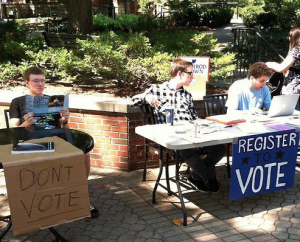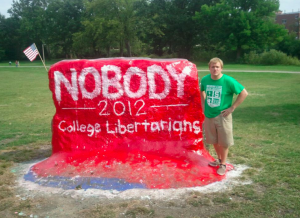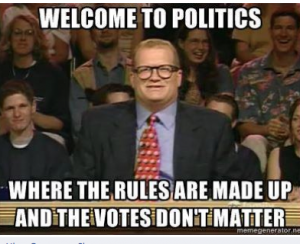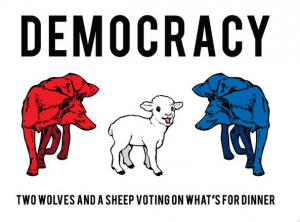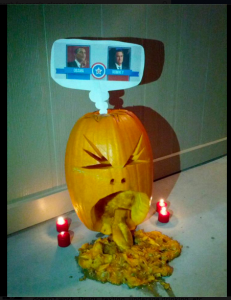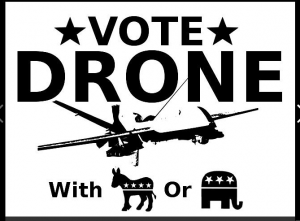by Liana Gamber Thompson
My Facebook feed looked pretty weird on Election Day and the days leading up to it. Between academic colleagues and liberal college friends, the presence of pro-Obama memes, articles, and proclamations was strong. The Democrats were counterbalanced, though, by a smaller but vocal contingent of conservative friends and relatives from Georgia, where I lived until my early twenties.
By far the most prolific posters, however, were the 40 or so young people I had friended through my research on young libertarians and participatory politics. While I could probably pen a whole other blog post on the methodological practice of adding one-time research participants to your social network, it turned out to be a good decision both in terms of the research and staying in touch with new friends.
It also shed light on the circulatory practices of a community that, by and large, is made up of categorical non-voters (I’ve written more about this topic here). The prevalence of this non-voting stance was quite surprising, as I assumed going in to the research that most young libertarians, or participants in the student Liberty Movement as they call it, would be casting votes for Ron Paul or Gary Johnson. While I found some Paul and Johnson supporters, the majority of the young libertarians I interviewed remained wary of voting and its democratic efficacy (I avoid making sweeping generalizations about all young libertarians based on this small sample size, though).
Ann said of voting, “It’s just not something that is worth it right now for me to engage in.” She explained, “But the reason that I don’t vote isn’t in any way because I don’t care about the direction of our country.” Ann’s statement is illustrative of the widely held belief within the Liberty Movement that young libertarians’ time and energy might be better spent educating themselves and others about theory and politics than engaging in more “traditional” civic duties like voting. For many, the discursive and ideological projects of shifting public opinion and “advancing liberty” took precedence over allegiance to the Libertarian Party or to a particular candidate.
And this point of view is actually not unique to libertarians. In a 2007 report on Millennials and politics for CIRCLE, Abby Kiesa et al. found that “Very few students say that voting is the most beneficial vehicle for addressing public issues; in fact, voting by far receives the least support.” Kiesa et al. also found that, “students think that voting is necessary, but view it more as a “symbolic gesture” than a means of creating change.”
In the onslaught of political messages and memes that littered Facebook, Twitter, and Tumblr in the days leading up to the election, these young libertarians created their own economy of material, much of which was related to non-voting. Witness this image of an unknown student that circulated widely on Facebook:
Along with this picture of a student from Michigan State University:
This meme of actor/comedian Drew Carey, who has been a vocal proponent of small government, also critiques voting:
While this image questions whether voting even supports democracy:
Other images, while not directly critical of voting, made clear the negative repercussions of engaging in two-party politics. This image, which cleverly incorporates the Obama and Romney campaign logos, contains a self-explanatory statement on the outcome of voting for either of the two candidates:
This Halloween-themed photo illustrates just how this pumpkin feels about Obama and Romney:
While this image simultaneously serves as a plea for viewers not to vote for Obama or Romney and as a critique of the use of drones in foreign wars:
Such images illustrate how the non-voting stance has become encoded into the Liberty Movement’s iconography. What’s more, they show how, through the din of (often negative) political ads and aggressive internet campaigns, these young libertarians persisted in creating their own slogans and commentaries. In a campaign season where third party candidates were shut out of nationally televised Presidential debates, they created their own debates online. The media artifacts above are a reminder that, as the two-party contest raged on, a small but vocal population tapped their creative resources to comment on the state of politics in their own way.

